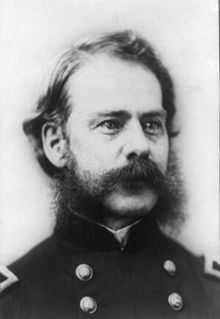 |
| Lt. Colonel James A Hardie |
HEADQUARTERS ARMY OF THE POTOMAC, October 7, 1862-11.35 p.m.
The PRESIDENT OF THE UNITED STATES:
I have issued the following order, on your proclamation:
GENERAL ORDERS,
HEADQUARTERS ARMY OF THE POTOMAC,
No. 163. Camp near Sharpsburg, Md., October 7, 1862.
The attention of the officers and soldiers of the Army of the Potomac is called to General Orders, No. 139, War Department, September 24, 1862, publishing to the army the President's proclamation of September 22.*
A proclamation of such grave moment to the nation, officially communicated to the army, affords to the general commanding an opportunity of defining specifically to the officers and soldiers under his command the relation borne by all persons in the military service of the United States toward the civil authorities of the Government.
The Constitution confides to the civil authorities-legislative, judicial, and executive-and power and duty of making, expounding, and executing the Federal laws. Armed forces are raised and supported simply to sustain the civil authorities, and are to be held in strict subordination thereto in all respects. This fundamental rule of our political system is essential to the security of our republican institutions, and should be thoroughly understood and observed by every soldier. The principle upon which, and the object for which, armies shall be employed in suppressing rebellion, must be determined and declared by the civil authorities, and the Chief Executive, who is charged with the administration of the national affairs, is the proper and only source through which the needs and orders of the Government can be made known to the armies of the nation.
Discussions by officers soldiers concerning public measures determined upon and declared by the Government, when carried at all beyond temperate and respectful expressions of opinion, tend greatly to impair and destroy the discipline and efficiency of troops, by substituting the spirit of political faction for that firm, steady, and earnest support of the authority of the Government which is the highest duty of the American soldier. The remedy for political errors, if any are committed, is to be found only in the action of the people at the polls.
In thus calling the attention of this army to the true relation between the soldier and the Government, the general commanding merely adverts to an evil against which it has been thought advisable during our whole history to guard the armies of the Republic, and in so doing he will not be considered by any right-minded person as casting any reflection upon that loyalty and good conduct which has been so fully illustrated upon so many battle-fields.
In carrying out all measures of public policy, this army will, of course, be guided by the same rules of mercy and Christianity that have ever controlled its conduct toward the defenseless.
By command of Major-General McClellan:
JAS. A. HARDIE,
Lieutenant-Colonel, Aide-de-Camp, and Acting Assistant Adjutant-General.
Series I., Vol. 19, Part 2, Page 396
*See Series III.
The Emancipation Proclamation was issued to the Army in the form of General Orders 139. It was not received well by that portion of the Army which believed the sole purpose of the war was the restoration of the Union, not emancipation. McClellan himself tended to this view. The purpose of this letter to Lincoln is unclear. Perhaps it was intended to convey to the President McClellan's respect for constitutional authority, although why he would believe it necessary is a matter of conjecture. Lincoln himself had remarked the Army of the Potomac seemed to be McClellan's personal bodyguard. While there is scant evidence the President ever feared a military uprising against the administration, he likely wondered how far McClellan would go to carry out its wishes.
No comments:
Post a Comment